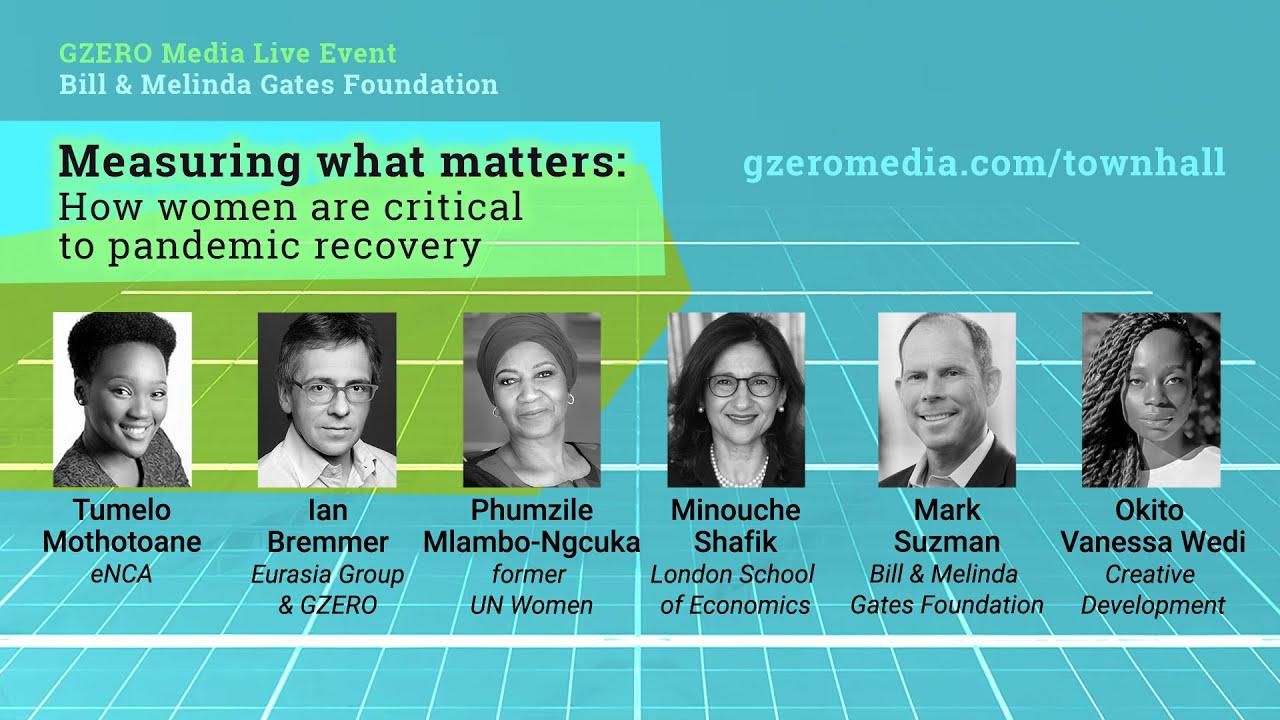What pandemic result will have the largest and longest-lasting impact on women? Is the world really building back better for half the global population? How can we ensure that the post-pandemic recovery is fair to women? And how does this all play into a wider GZERO world? A group of global experts debated these and other questions during a livestream conversation hosted by GZERO Media in partnership with the Bill & Melinda Gates Foundation, moderated by eNCA senior news anchor Tumelo Mothotoane.
Dr. Okito Vanessa Wedi, founder and CEO of Creative Development, discussed the terrible impact that COVID misinformation had on women of child-bearing age, how pandemic-related lockdowns and school closures have created a perfect storm for violence against women, and the need to come up with new metrics to value caregiving.
London School of Economics Director Minouche Shafik explained why so much talent has been wasted by women being forced to drop out of the workforce, why we should include support for women caregivers in a new social contract, why investing in women's education is a virtuous circle for economic growth, and why it's time to reassess and come up with a fairer social system.
Phumzile Mlambo-Ngcuka, former head of UN Women, underscored how many women gave fallen through the tracks after being been caught in a crossfire not of their own making during the pandemic, why violence against women won't end with lifting lockdowns, and why women need digital skills to access remote jobs.
Eurasia Group and GZERO Media President Ian Bremmer pondered what the absence of US leadership means for women now in places like Afghanistan or Yemen, and how flexible work could really help women if they get the skills and support they need.
Bill & Melinda Gates Foundation CEO Mark Suzman analyzed the structural reasons behind the lack of follow-up to the 1995 Beijing Declaration to advance women's rights around the world, and offered some reasons for optimism regarding the future for women in a post-pandemic world.
- Afghan girls should stay in school despite Taliban rule, activist says ... ›
- Is modern society broken? - GZERO Media ›
- The pandemic is hurting women more than men - GZERO Media ›
- Why the pandemic has been worse for women: UN Women's ... ›
- Latin America faces post-pandemic "lost decade," says economic ... ›
- How can small businesses thrive after COVID? - GZERO Media ›
- Should small businesses embrace public-private partners? - GZERO Media ›
- Is global economic inequality getting worse? - GZERO Media ›
- The global economy: good news and bad news from economist Dambisa Moyo - GZERO Media ›
- The online abuse crisis threatens the mental health of young women worldwide - GZERO Media ›
- Why pandemic was "perfect storm" for violence against women: Dr. Okito Wedi - GZERO Media ›
- Silver lining from COVID? Women around the world got access to digital payments - GZERO Media ›
- Minouche Shafik: Keeping talented women working is good for the economy - GZERO Media ›
- Empowering women: UN global survey reveals women's priorities - GZERO Media ›
- Global economy at risk if Middle East conflict expands, says World Bank's Ayhan Kose - GZERO Media ›
More For You
In this Quick Take, Ian Bremmer weighs in on the politicization of the Olympics after comments by Team USA freestyle skier Hunter Hess sparked backlash about patriotism and national representation.
Most Popular
100 million: The number of people expected to watch the Super Bowl halftime performance with Bad Bunny, the Puerto Rican superstar and newly minted Album of the Year winner at the Grammys.
Brazilian skiers, American ICE agents, Israeli bobsledders – this is just a smattering of the fascinating characters that will be present at this year’s Winter Olympics. Yet the focus will be a different country, one that isn’t formally competing: Russia.
What We’re Watching: Big week for elections, US and China make trade deals, Suicide bombing in Pakistan
Japanese Prime Minister Sanae Takaichi, president of the Liberal Democratic Party (LDP), appeals for a candidate during a street speech of the House of Representatives Election Campaign in Shintomi Town, Miyazaki Prefecture on February 6, 2026. The Lower House election will feature voting and counting on February 8th.
Japanese voters head to the polls on Sunday in a snap election for the national legislature’s lower house, called just three months into Prime Minister Sanae Takaichi’s tenure.
